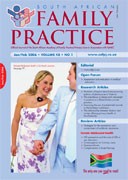CPD Article: Dysmenorrhoea.
Abstract
Dysmenorrhoea is the leading cause of recurrent short-term school absence in adolescent girls and a common problem in women of reproductive age. Risk factors for dysmenorrhoea include nulliparity, heavy menstrual flow, smoking, and depression. Empiric therapy can be initiated based on a typical history of painful menses and a negative physical examination. Non-steroidal anti-inflammatory drugs are the initial therapy of choice in patients with presumptive primary dysmenorrhoea. Oral contraceptives and depo-medroxyprogesterone acetate also may be considered. If pain relief is insufficient, prolonged-cycle oral contraceptives or intravaginal use of oral contraceptive pills can be considered. In women who do not desire hormonal contraception, there is some evidence of benefit with the use of topical heat; the Japanese herbal remedy toki-shakuyaku-san; thiamine, vitamin E, and fish oil supplements; a low-fat vegetarian diet; and acupressure. If dysmenorrhoea remains uncontrolled with any of these approaches, pelvic ultrasonography should be performed and referral for laparoscopy should be considered to rule out secondary causes of dysmenorrhea. In patients with severe refractory primary dysmenorrhoea, additional safe alternatives for women who want to conceive include transcutaneous electric nerve stimulation, acupuncture, nifedipine, and terbutaline. Otherwise, the use of danazol or leuprolide may be considered and, rarely, hysterectomy. The effectiveness of surgical interruption of the pelvic nerve pathways has not been established. (SA Fam Pract 2006;48(1): 35-41) (Copyright © 2005 American Academy of Family Physicians. This article is reprinted with permission from Am Fam Physician 2005;71:285-91, 292) Permission from the AAFP was granted to publish this article in the hardcopy only. Kindly refer to www.aafp.org or subscribe to the hardcopy of South African Family Practice.
Published
2006-02-20
Section
CPD
By submitting manuscripts to SAFP, authors of original articles are assigning copyright to the South African Academy of Family Physicians. Copyright of review articles are assigned to the Publisher, Medpharm Publications (Pty) Ltd, unless otherwise specified. Authors may use their own work after publication without written permission, provided they acknowledge the original source. Individuals and academic institutions may freely copy and distribute articles published in SAFP for educational and research purposes without obtaining permission.

